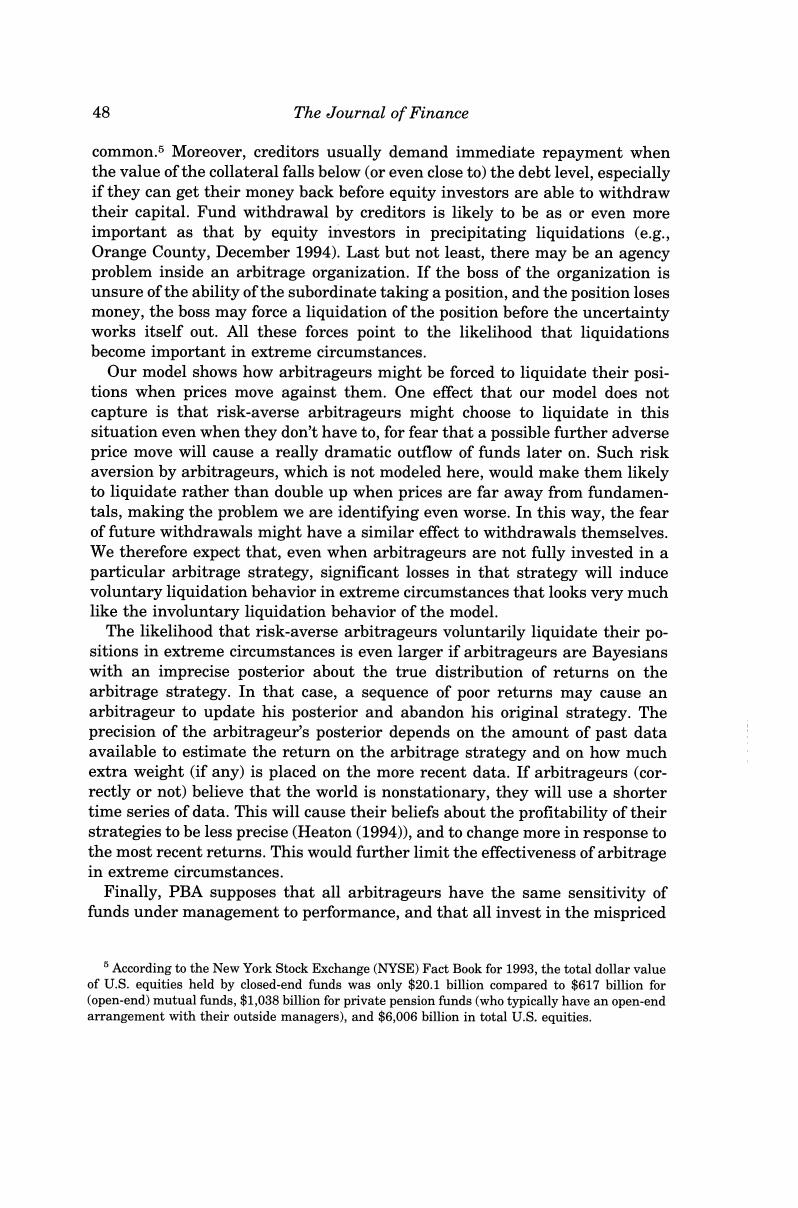正在加载图片...

48 The Journal of Finance common.5 Moreover,creditors usually demand immediate repayment when the value of the collateral falls below (or even close to)the debt level,especially if they can get their money back before equity investors are able to withdraw their capital.Fund withdrawal by creditors is likely to be as or even more important as that by equity investors in precipitating liquidations (e.g., Orange County,December 1994).Last but not least,there may be an agency problem inside an arbitrage organization.If the boss of the organization is unsure of the ability of the subordinate taking a position,and the position loses money,the boss may force a liquidation of the position before the uncertainty works itself out.All these forces point to the likelihood that liquidations become important in extreme circumstances. Our model shows how arbitrageurs might be forced to liquidate their posi- tions when prices move against them.One effect that our model does not capture is that risk-averse arbitrageurs might choose to liquidate in this situation even when they don't have to,for fear that a possible further adverse price move will cause a really dramatic outflow of funds later on.Such risk aversion by arbitrageurs,which is not modeled here,would make them likely to liquidate rather than double up when prices are far away from fundamen- tals,making the problem we are identifying even worse.In this way,the fear of future withdrawals might have a similar effect to withdrawals themselves. We therefore expect that,even when arbitrageurs are not fully invested in a particular arbitrage strategy,significant losses in that strategy will induce voluntary liquidation behavior in extreme circumstances that looks very much like the involuntary liquidation behavior of the model. The likelihood that risk-averse arbitrageurs voluntarily liquidate their po- sitions in extreme circumstances is even larger if arbitrageurs are Bayesians with an imprecise posterior about the true distribution of returns on the arbitrage strategy.In that case,a sequence of poor returns may cause an arbitrageur to update his posterior and abandon his original strategy.The precision of the arbitrageur's posterior depends on the amount of past data available to estimate the return on the arbitrage strategy and on how much extra weight (if any)is placed on the more recent data.If arbitrageurs(cor- rectly or not)believe that the world is nonstationary,they will use a shorter time series of data.This will cause their beliefs about the profitability of their strategies to be less precise(Heaton(1994)),and to change more in response to the most recent returns.This would further limit the effectiveness of arbitrage in extreme circumstances. Finally,PBA supposes that all arbitrageurs have the same sensitivity of funds under management to performance,and that all invest in the mispriced 6 According to the New York Stock Exchange(NYSE)Fact Book for 1993,the total dollar value of U.S.equities held by closed-end funds was only $20.1 billion compared to $617 billion for (open-end)mutual funds,$1,038 billion for private pension funds(who typically have an open-end arrangement with their outside managers),and $6,006 billion in total U.S.equities